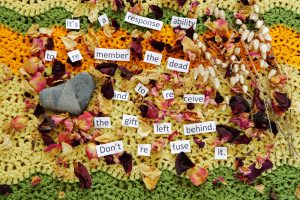I attend a weekly Qigong class. Qigong has become seamlessly interwoven into my other practices of Buddhist meditation and Amerta movement to enable me to continue to bring myself into a deeper connection with my body. Together they help me open and receive what is around me, as well as reflect on my human experience in this complex, wondrous world. This week we had a visiting Chinese teacher, Yan Cui. During the hour spent with her, I touched a mysterious sense of edge.
A great deal of what happens in Qigong is around opening and closing, inner and outer. There is the vast outer universe and a corresponding vast inner universe in each of us. Sensing this while doing Qigong, or Amerta movement, or during meditation, is a mysterious opening in itself. Qigong practice uses both body and mind to energetically move between the two of these, bringing them together into a harmonious sense of one. It is very beautiful, as well as enhancing both physical and mental health.
Yan Cui offered just two practices in the hour she spent with us. One was to stand facing the large window in the studio that looks out onto a lush garden with flowers, trees, and clouds. We opened our hands and arms (and our inner being) to the beautiful natural world we saw, and then, with our arms and hands, brought all that back into our inner being . We just silently did this for many minutes. The second practice was also simple. Standing, we bent over, spiraled our hands to “collect” qi, then lifted it up and, using our hands, slowly brought the qi all the way down through our body, scanning as we went for any sense of not-quite-right in the body, lingering in those places to allow the qi to work there. We did this, too, over and over, for many minutes. It felt powerfully rejuvenating.
Then she talked to us. She wanted to tell us what it is that’s actually important in Qigong. It’s not the movements of opening or closing, up or down, inner or outer. This is important practice for realising what it is that is really important – which is the transition from one to the other. That edge of change, she said, is the secret of Qigong. It was like hearing something I already knew, yet hadn’t quite put into a thought for myself. I suddenly say to Yan Cui, “This is not a place.” She smiles.
I once tried to think of this as a place, and found I could not. I think now about the Wood Pigeons that make such a curfuffle around here. They flap about in the tops of trees and seem clumsy and awkward, yet they are skillful and beautiful in flight. They first soar up, and then suddenly dip down in a beautiful curve. Perhaps they have the secret of Qigong.
